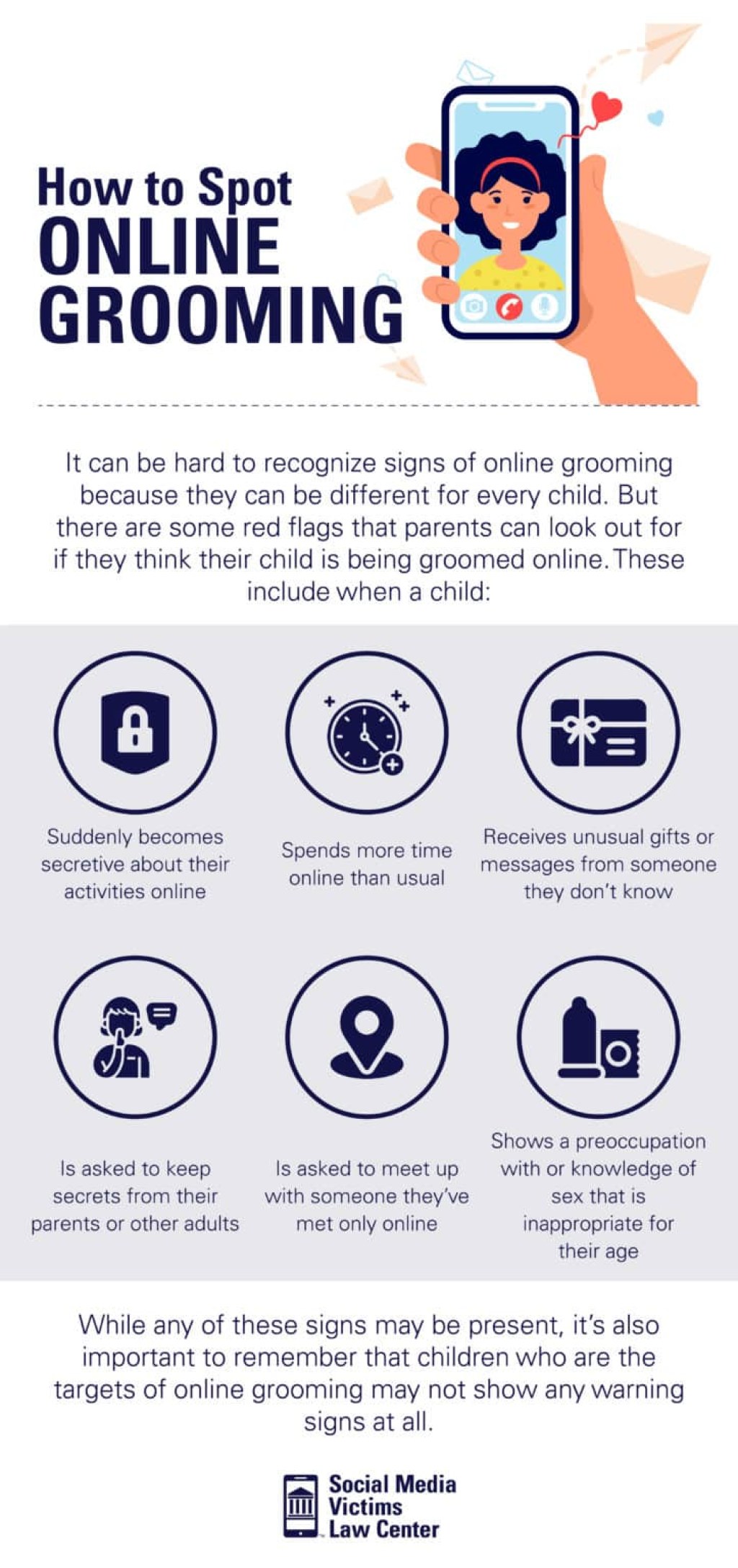Grooming Meaning Slang: The Secret Language of Online Predators
Introduction
Dear Readers,
Welcome to this informative article on the meaning of grooming in slang. In today’s digital age, it is crucial to stay informed and vigilant about online safety. By understanding the language used by online predators, we can better protect ourselves and our loved ones. In this article, we will delve into the world of grooming slang and provide you with valuable insights. So, let’s get started!
Table of Contents

Image Source: vox-cdn.com
1. What is Grooming Slang?
2. Who are the Targets?
3. When does Grooming Occur?

Image Source: theatlantic.com
4. Where does Grooming Take Place?
5. Why Do Predators Engage in Grooming?

Image Source: socialmediavictims.org
6. How Does Grooming Work?
7. Advantages and Disadvantages of Grooming Slang
8. Frequently Asked Questions
9. Conclusion
10. Final Remarks
What is Grooming Slang?
In the world of online predators, grooming slang refers to the use of deceptive and manipulative language to establish a connection with potential victims. This secret language allows predators to gain the trust of their targets and create an environment conducive to exploitation. Emoji plays a significant role in grooming slang, as they can convey hidden meanings and intentions. It is important to be aware of the various terms and symbols used in grooming slang to protect ourselves and others.
Hidden Meanings in Grooming Slang
1. Netflix and chill – This seemingly innocent phrase often implies a desire for sexual activity.
2. Sending pics – Requesting explicit photos from the target.
3. RP or Roleplay – Engaging in sexual fantasies or scenarios.
4. ASL – Asking for the target’s age, sex, and location, a common tactic used to gather personal information.
5. KYS – An abbreviation for kill yourself, used as a form of manipulation and emotional abuse.
6. Catfishing – Pretending to be someone else online to deceive and manipulate the target.
7. Sugar daddy – A term used to lure young individuals into exploitative relationships in exchange for financial benefits.
Who are the Targets?
Grooming slang primarily targets vulnerable individuals, particularly children and teenagers. Predators often prey on those who are seeking validation, attention, or companionship online. They exploit the trust and naivety of their targets, gradually manipulating them into compromising situations. It is crucial for parents, guardians, and educators to be aware of the signs of grooming and actively engage in conversations about online safety with young individuals.
Signs of Grooming
1. Excessive secrecy about online activities.
2. Sudden change in behavior, mood, or appearance.
3. Receiving gifts or money from unknown sources.
4. Withdrawing from friends and family in favor of online relationships.
5. Expressing secrecy or discomfort when discussing online interactions.
6. Spending excessive amounts of time online, especially during odd hours.
7. Inappropriate knowledge or interest in sexual topics beyond their age group.
When does Grooming Occur?
Grooming can occur at any time when individuals are active online. Predators are skilled at identifying potential victims and initiating contact under various pretexts. They often exploit popular social media platforms, online gaming communities, and chat rooms to establish connections. It is important to be cautious and vigilant, regardless of the time or platform being used.
Popular Platforms for Grooming
1. Social media platforms like Facebook, Instagram, and Snapchat.
2. Online gaming communities and chatrooms.
3. Dating apps and websites.
4. Video streaming platforms like YouTube and TikTok.
5. Messaging apps such as WhatsApp and Kik.
6. Online forums and discussion boards.
7. Online marketplaces and classified ads websites.
Where does Grooming Take Place?
Grooming can take place in both public and private online spaces. Predators often start their grooming process in public platforms, where they can establish initial contact and build rapport. They then transition to private messaging or other platforms to continue their manipulation away from prying eyes. It is important to remember that grooming can happen anywhere online, so it is crucial to exercise caution and be aware of potential dangers.
Transition from Public to Private Spaces
1. Initiating contact on a public social media post and then moving to private direct messages.
2. Starting a conversation in an online gaming community and then switching to a private chat within the game.
3. Engaging in public discussions on online forums and then exchanging personal contact details privately.
4. Connecting on a dating app and then transitioning to a private messaging platform.
5. Meeting someone through a video streaming platform and then engaging in private video chats.
6. Joining a public group chat and then establishing a private group with selected individuals.
7. Responding to a classified ad and then communicating via private email or messaging apps.
Why Do Predators Engage in Grooming?
Predators engage in grooming to manipulate and exploit their victims for various reasons. These can include sexual gratification, financial gain, or control and power. Grooming allows predators to establish trust and emotional connections with their targets, making it easier to manipulate them into compromising situations. By understanding their motives, we can better protect ourselves and others from falling victim to these predators.
Motives of Predators
1. Sexual exploitation: Predators groom individuals to engage in sexual activities, either online or offline.
2. Financial gain: Some predators use grooming to exploit individuals financially, such as through scams or fraud.
3. Emotional manipulation: Grooming allows predators to control and manipulate the emotions of their victims.
4. Power and control: Predators derive satisfaction from exerting power and control over vulnerable individuals.
5. Revenge or harm: Grooming can be used as a means of seeking revenge or inflicting harm on others.
6. Trafficking: Grooming can be a precursor to human trafficking, as predators lure individuals into exploitative situations.
7. Personal satisfaction: Some predators engage in grooming simply for personal gratification or entertainment.
How Does Grooming Work?
Grooming involves a series of carefully planned steps to manipulate and gain the trust of the targeted individual. Predators use various techniques to establish rapport, exploit vulnerabilities, and gradually escalate the level of engagement. By understanding these tactics, we can recognize the warning signs and protect ourselves from falling victim to grooming.
The Grooming Process
1. Identifying potential targets based on vulnerability and online presence.
2. Initiating contact using common interests or shared experiences to establish rapport.
3. Building trust by offering emotional support, compliments, and understanding.
4. Gradually introducing sexual or inappropriate topics to desensitize the target.
5. Isolating the target from friends and family, making them emotionally dependent on the predator.
6. Requesting explicit images or engaging in sexual conversations, often using blackmail or threats.
7. Exploiting the target for sexual or financial gain, emotional manipulation, or other purposes.
Advantages and Disadvantages of Grooming Slang
Grooming slang, like any form of language, has both advantages and disadvantages. It is important to understand these to navigate the online world effectively and protect ourselves and others from potential harm.
Advantages
1. Awareness: Knowledge of grooming slang allows us to be more alert and recognize potential dangers.
2. Identification: Understanding grooming slang helps us identify potential predators and protect potential victims.
3. Communication: Awareness of grooming slang enables open conversations about online safety among peers and loved ones.
Disadvantages
1. Evolving Language: Grooming slang is constantly evolving, making it challenging to keep up with the latest terms and emojis.
2. Accessibility: Grooming slang can be easily accessible to both predators and potential victims.
3. Misinterpretation: Some slang terms may have innocent meanings, leading to misinterpretation and confusion.
Frequently Asked Questions
Q1: How can I protect myself or my loved ones from grooming?
A1: It is important to educate yourself and others about online safety, establish open lines of communication, and be vigilant for potential warning signs.
Q2: Are there any signs that someone is being groomed?
A2: Yes, signs of grooming can include excessive secrecy, mood changes, receiving gifts or money, withdrawal from social activities, and inappropriate knowledge or interest in sexual topics.
Q3: Should I confront someone I suspect is being groomed?
A3: It is essential to report suspicions to the appropriate authorities and let them handle the situation. Confronting a potential predator can escalate the danger.
Q4: How can I talk to my children about grooming?
A4: Start by establishing an open and non-judgmental environment for discussions. Use age-appropriate language and resources to explain the risks of grooming and empower them with knowledge to stay safe.
Q5: What should I do if I suspect someone is grooming me?
A5: Trust your instincts and take immediate action. Cease all contact with the individual, gather evidence, and report the situation to the authorities or a trusted adult.
Conclusion
Dear Readers,
Grooming meaning slang is a dark and manipulative language that online predators use to exploit vulnerable individuals. By familiarizing ourselves with grooming slang, understanding the motives of predators, and recognizing the warning signs, we can protect ourselves and others from falling victim to these dangerous tactics. It is crucial to educate ourselves, engage in open conversations about online safety, and remain vigilant in the digital world. Let’s stand together against grooming and create a safer online environment for everyone.
Final Remarks
Dear Friends,
As we conclude this article on grooming meaning slang, it is essential to remember that online safety should always be a top priority. The internet offers countless opportunities for connection and growth, but it also harbors risks that we must be aware of. By staying informed, communicating openly, and seeking support when needed, we can navigate the digital landscape with confidence and ensure a safer online experience for ourselves and future generations.